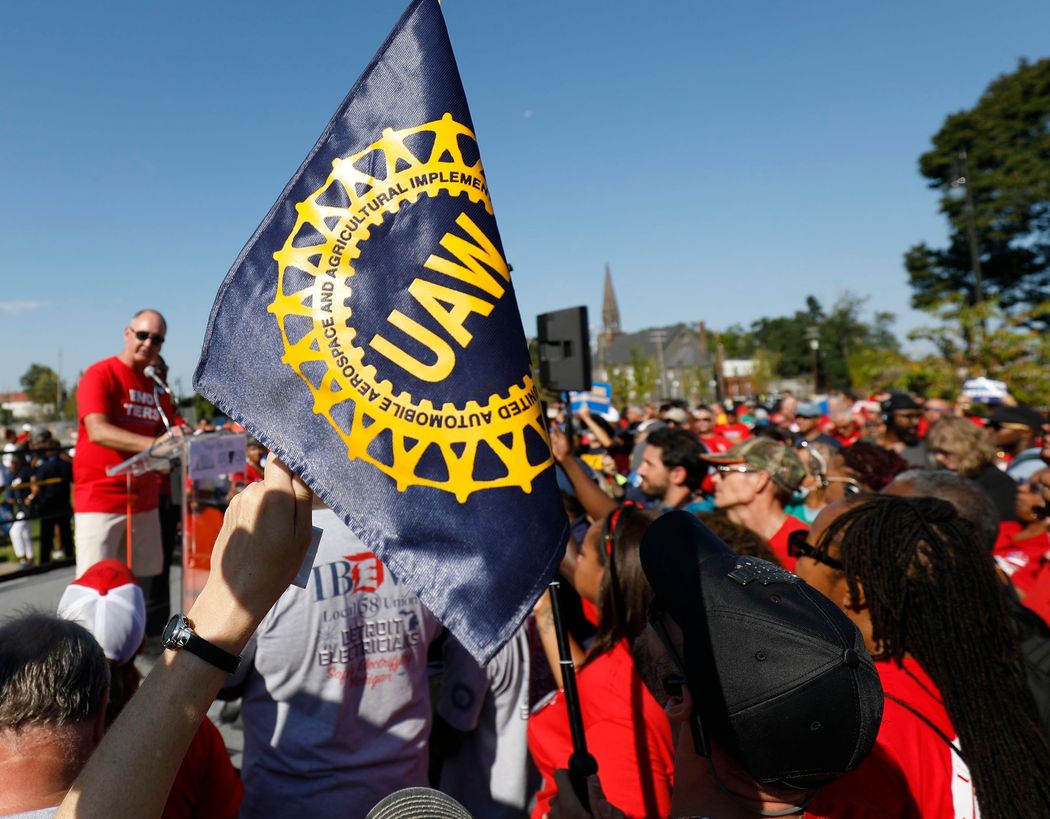
Swap Agrawal is a student at Harvard Law School.
In this weekend’s news and commentary, UAW expands its strike activity, files an unfair labor practice charge against Sen. Tim Scott (R-SC), and hosts Biden on picket line. Also, an NLRB Administrative Law Judge issues the first Cemex bargaining order.
On Friday, United Auto Workers (UAW) President Shawn Fain announced that the union is expanding strikes to 38 parts and distribution facilities operated by General Motors and Stellantis across 20 states. Roughly 5,600 more workers will go on strike on top of the 12,700 workers who walked out of three Ford, GM, and Stellantis assembly plants last week. By targeting parts and distribution facilities rather than production plants, UAW hopes to slow repair operations for consumers. “Our message to the consumer is simple: The way to fix the frustrating customer experience is for the companies to end price gauging. Invest these record profits into stable jobs and stable wages and benefits,” said Fain.
Ford is safe from expanded strike activity for now. “We still have serious issues to work through, but we do want to recognize that Ford is showing that they’re serious about reaching a deal,” said Fain. “At GM and Stellantis, it’s a different story.” Ford has made progress with UAW on eliminating some wage tiers, reinstating cost of living adjustments, conversion of temporary workers to full-time status, the right to strike over plant closures, and an improved profit-sharing formula. However, Fain said that the two sides “still have significant gaps to close on the key economic issues,” such as the size of wage increases.
On Thursday, Fain filed an unfair labor practice charge against Sen. Tim Scott (R-SC) due to Scott’s statement suggesting that striking UAW workers should be fired. After a voter asked the senator about the UAW strike at a campaign event in Iowa on Monday, Scott responded saying, “I think Ronald Reagan gave us a great example when federal employees decided they were going to strike. He said, ‘You strike, you’re fired.’ Simple concept to me, to the extent that we can use that once again.” Under the NLRA, anyone can file a charge against an employer regardless of whether they are an employee of that employer. The ULP accuses Scott of interfering with the Section 7 rights of the employees of his campaign. “A statement as direct as ‘if you strike, you’re fired’ is textbook unfair labor practice language because workers can’t be fired for striking,” Professor Sachs told The Intercept. “Telling workers they’ll be fired for striking is violating federal labor law, and that’s not something becoming of a senator.”
On Friday, President Biden announced that he will travel to Michigan to join a UAW picket line. Biden wrote on X, previously known as Twitter, that he will “stand in solidarity with the men and women of UAW as they fight for a fair share of the value they helped create.” This is perhaps the most significant display of union solidarity ever by a sitting US president. Former President Donald Trump also has plans to visit current and former autoworkers in Michigan next week, despite backlash from UAW President Fain. A person familiar with Trump’s plans said that he is “unlikely to go to the picket line” but that such a stop “has not been ruled in or out.” The contest over the support of blue-collar workers will continue to heat up as the 2024 elections approach.
On Thursday, an NLRB administrative law judge issued the first Cemex bargaining order. The case involved allegations that a cannabis dispensary in Salem, Massachusetts engaged in objectionable conduct affecting the results of a representation election. After the United Food and Commercial Workers International Union (UFCW) Local 1445 begin organizing at the dispensary, a majority of workers at the Salem store signed a letter demanding that their employer recognize and bargain with the union. The employer demanded an election and began engaging in objectionable conduct, including promising employees increased benefits if they refrained from supporting the union, threatening employees with adverse consequences if the union were to win, preventing employees from discussing the union while allowing conversation about non-work related topics, and discipling and discharging workers for engaging in union activities. The General Counsel argued that the employer’s conduct left only a slight possibility of a fair rereun election, and the ALJ accordingly set aside the election and issued a remedial bargaining order.






Daily News & Commentary
Start your day with our roundup of the latest labor developments. See all
December 12
OH vetoes bill weakening child labor protections; UT repeals public-sector bargaining ban; SCOTUS takes up case on post-arbitration award jurisdiction
December 11
House forces a vote on the “Protect America’s Workforce Act;” arguments on Trump’s executive order nullifying collective bargaining rights; and Penn State file a petition to form a union.
December 8
Private payrolls fall; NYC Council overrides mayoral veto on pay data; workers sue Starbucks.
December 7
Philadelphia transit workers indicate that a strike is imminent; a federal judge temporarily blocks State Department layoffs; and Virginia lawmakers consider legislation to repeal the state’s “right to work” law.
December 5
Netflix set to acquire Warner Bros., Gen Z men are the most pro-union generation in history, and lawmakers introduce the “No Robot Bosses Act.”
December 4
Unionized journalists win arbitration concerning AI, Starbucks challenges two NLRB rulings in the Fifth Circuit, and Philadelphia transit workers resume contract negotiations.